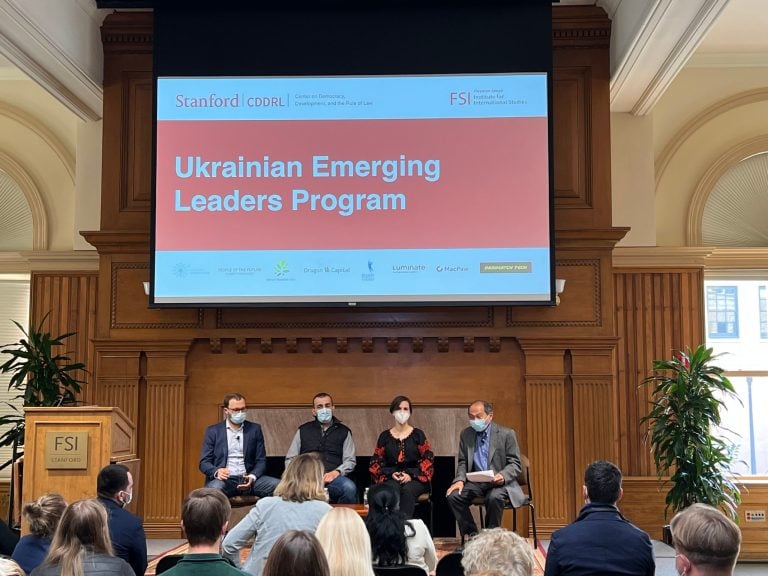Stanford welcomed its fourth cohort of the Ukrainian Emerging Leaders Program (UELP) at a Tuesday event during which the new fellows discussed their past work and future plans at the University.
Since 2017, the UELP has sponsored three mid-career practitioners from Ukrainian government, law, entrepreneurship and civil society organizations annually to spend ten months at Stanford. The academic training fellowship aims to address development challenges in Ukraine and the broader region.
The three fellows — Yulia Bezvershenko, Denis Gutenko and Nariman Ustaiev — were slated to arrive on campus in October 2020, but the pandemic postponed the on-campus program until this academic year.
While on the Stanford campus, the fellows “go to classes and they meet people, but we also ask them to work on a project that relates to some issue back in Ukraine that they want to take back with them,” said Francis Fukuyama, a senior fellow at the Freeman Spogli Institute for International Studies (FSI) who advises the program.
Bezvershenko led the Directorate for Science and Innovation at Ukraine’s Ministry of Education and Science prior to coming to Stanford. Originally trained as a theoretical physicist, she now works on policies that reform the country’s research and innovation sectors.
While Ukrainian scientists are able to choose their scientific directions, interests and pace, they are often confronted with outdated research infrastructure, limited funds and bureaucratic hassles, Bezvershenko said at the Tuesday event, recounting her own experience as a scientist.
“The problem in Ukraine is that we generate young, bright minds, but they have no place in the country,” Bezvershenko said. She hopes to create a “knowledge-based Ukraine” where knowledge is created, shared and utilized by industry, business and government.
Gutenko, like Bezvershenko, was also a Ukrainian government official before becoming a UELP fellow. He served as the head of the State Fiscal Service in Ukraine from 2019 to 2020, and before that he was an official at the Ukrainian Ministry of Economy. Prior to entering government service, Gutenko worked in the private sector as a banker, auditor and agribusiness manager.
At the event, he reflected on why the bureaucratic machine does not work as effectively as it could.
“I understand it’s all about the people who work for it. People design institutions and procedures and implement rules,” he said.
Through the UELP fellowship, Gutenko said he wants to examine how the Ukrainian government bureaucracy could better attract and retain talents. Gutenko also hopes to explore the startup ecosystem in Silicon Valley, as he has worked on entrepreneurship throughout his career in the Ukrainian government.
Ustaiev is the co-founder and director at Gasprinski Institute for Geostrategy, a research organization based in Ukraine. He is a foreign policy and security expert who has focused on Russian policy since Russian President Vladimir Putin’s annexation of Crimea in 2014.
His project at Stanford will focus on strengthening the Crimean Platform, a diplomatic initiative aimed at reversing Russia’s annexation of the region and creating a democracy ecosystem for Crimea.
The UELP was founded in 2016 by former John S. Knight Fellow Oleksandr Akymenko and former John S. Knight Fellow Affiliate Kateryna Akymenko. The program is hosted by the Center on Democracy, Democracy and the Rule of Law at FSI.
The UELP is only one of a number of FSI programs that train foreign political and business leaders. Others include the Drapers Hill Summer Fellows Program, a three-week program for global democratic leaders and the Leadership Academy for Development, a training workshop for mid-career professionals from developing countries.
